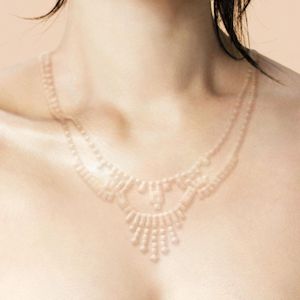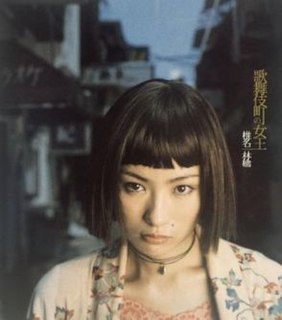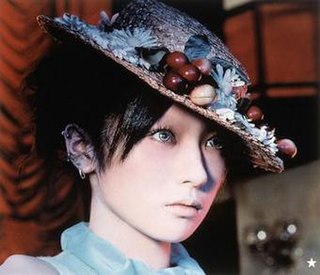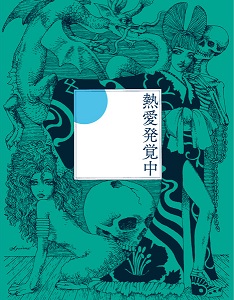 W
W"Amagasa" is a song by Japanese band Tokio. It was one of the two A-sides that composed the band's 39th single, along with the song "Akireru Kurai Bokura wa Negaō". The single was released on September 3, 2008, and was their first release with J Storm. "Amagasa" was written by Japanese rock musician Ringo Sheena. In 2014, Sheena covered the two songs she wrote for the single, "Amagasa" and "Kachū no Otoko", for her album Gyakuyunyū: Kōwankyoku.
 W
W"Ariamaru Tomi" was Japanese singer Shiina Ringo's first single as a solo artist in five years. It was released on May 27, 2009, the same day her debut single was released eleven years earlier. The distributor is EMI Music Japan / Virgin Music.
 W
W"Arikitari na Onna" , also known by its French title "Une femme ordinaire", is a song by Japanese musician Ringo Sheena. It was the leading promotional song for her fifth album Hi Izuru Tokoro on October 1, 2014.
 W
W"Cappuccino" is a single by Japanese entertainer Rie Tomosaka, released on January 27, 1999. "Cappuccino" and its B-side "Mokuren no Cream" were both written by musician Ringo Sheena. In 2014, Sheena released a cover of the song on her album Gyakuyunyū: Kōwankyoku, which reached number 98 on the Billboard Adult Alternative Chart.
 W
W"Carnation" , also known by its French title L'œillet, is a song by Japanese musician Ringo Sheena. It was released on November 2, 2011, two years after her previous solo single "Ariamaru Tomi" (2009), during a period where she primarily worked with her band Tokyo Jihen. The song was the eponymous theme song for the morning Asadora drama Carnation, starring Machiko Ono.
 W
W"Gips" is Japanese singer Ringo Sheena's 5th single and it was released on January 26, 2000, by Toshiba EMI / Virgin Music. The single was certified double platinum by the RIAJ for 800,000 copies shipped to stores and later gold for 100,000 downloads to cellphones in 2010.
 W
W"Honnō" is Japanese singer Ringo Sheena's 4th single and it was released on October 27, 1999, by Toshiba EMI / East World. The single was certified double platinum by the RIAJ for 800,000 copies shipped to stores, and later gold for 100,000 downloads to cellphones in 2011.
 W
WKalk Samen Kuri no Hana , also known as Kalk Samen Chestnut Flower and Chlorine Semen Chestnut Flower, is the third studio album by Japanese singer-songwriter Ringo Sheena, released on February 23, 2003, on Toshiba EMI / Virgin Music. The album's lead single was a massive success, topping the Oricon charts for the first time in her career.
 W
W"Irohanihoheto" (いろはにほへと), also known by its French title "Les Couleurs Chantent", is a song by Japanese musician Ringo Sheena. It was initially released digitally on April 30, 2013, and on May 27 released as one of the A-sides of her 14th single, along with the song "Kodoku no Akatsuki". The release date was the 15th anniversary of the release of Sheena's debut single "Kōfukuron" in 1998. The song was used as the theme song for the drama Kamo, Kyōto e Iku.: Shinise Ryokan no Okami Nikki.
 W
W"Jiyū e Michizure" is Japanese singer-songwriter Ringo Sheena's digital single, released on May 16, 2012. The song is featured as the theme song for the Japanese television drama Ataru. "Jiyū e Michizure" reached number one in iTunes Store charts, peaked at 5 on the Japan Hot 100, and at 7 on the RIAJ Digital Track Chart. It was certified gold for 100,000 copies downloaded to computers in 2013.
 W
W"Kabukichō no Joō" is Japanese singer Ringo Sheena's 2nd single and it was released on September 9, 1998 by Toshiba EMI, East World. It was certified gold for 100,000 downloads to cellphones by the RIAJ in 2011.
 W
W"Karisome Otome" is a song written by Japanese singer Ringo Sheena and has several versions.
 W
W"Ketteiteki Sanpunkan" is one of the two songs that made up the fourth single by Japanese entertainer Chiaki Kuriyama, along with "Oishii Kisetsu". They were released on March 2, 2011, as the lead singles from her debut album Circus, released two weeks later. Both songs were produced by musician Ringo Sheena, who covered "Ketteiteki Sanpunkan" for her album Gyakuyunyū: Kōwankyoku in 2014.
 W
W"Kodoku no Akatsuki" is a song by Japanese musician Ringo Sheena. It was released as one of the A-sides of her 14th single, along with the song "Irohanihoheto", released on May 27, 2013. The release date was the 15th anniversary of the release of Sheena's debut single "Kōfukuron" in 1998.
 W
W"Kōfukuron" is the debut single by Japanese singer Ringo Sheena and it was released on May 27, 1998 by Toshiba EMI, East World. Since Sheena suddenly gained popularity, it was decided that this single was resold as a 12 cm single. New edition, including the new song, was re-released with the fourth single "Honnō" on October 27, 1999. The 1999 edition was certified gold by the RIAJ for 200,000 copies shipped to stores.
 W
W"Koko de Kiss Shite." is Japanese singer Ringo Sheena's 3rd single and it was released on January 20, 1999, by Toshiba EMI, East World. It was certified gold twice by the RIAJ: Once in 1999 for 200,000 physical copies shipped, and once in 2011 for 100,000 paid downloads to cellphones.
 W
W"Kono Yo no Kagiri" was released by Ringo Sheena, Neko Saito and Junpei Shiina on January 17, 2007 in the name of 椎名林檎×斎藤ネコ+椎名純平 . It was certified gold by the RIAJ for 100,000 copies shipped to stores in 2007.
 W
W"Koroshiya Kiki Ippatsu" , also known by its English title "The Assassin's Assassin," is a single by Japanese jazz band Soil & "Pimp" Sessions, featuring singer and songwriter Ringo Sheena. It was released on June 12, 2013 digitally and on June 26 as a single, two months after Soil & "Pimp" Sessions' single "Jazzy Conversation," and one month after Sheena's single "Irohanihoheto/Kodoku no Akatsuki."
 W
W"Mayonaka wa Junketsu" is Japanese singer Ringo Sheena's 6th single and it was released on March 27, 2001 by Toshiba EMI / Virgin Music.
 W
W"Netsuai Hakkakuchū" , also known by its French title "J'ai trouvé l'amour" is a song by Japanese musician Ringo Sheena. It was her first collaboration with electronic producer and Capsule member Yasutaka Nakata, and was released as a single to promote her collaboration compilation album Ukina.
 W
W"Nippon" is a song by Japanese musician Ringo Sheena. It was released as a single on June 11, 2014, two weeks after her self-cover album Gyakuyunyū: Kōwankyoku and a year after her previous solo single "Irohanihoheto" / "Kodoku no Akatsuki". The song is being used as the 2014 soccer theme song for NHK.
 W
W"Oishii Kisetsu" is one of the two songs that made up the fourth single by Japanese entertainer Chiaki Kuriyama, along with "Ketteiteki Sanpunkan". They were released on March 2, 2011, as the lead singles from her debut album Circus, released two weeks later. Both songs were produced by musician Ringo Sheena.
 W
W"Saisakizaka" is the debut single by Japanese actress Yōko Maki, released on May 27, 2013. The Ringo Sheena-produced song was used as the theme song to the film The Ravine of Goodbye (2013), Maki's first leading film role since Veronika Decides to Die in 2005.
 W
W"Shijō no Jinsei" is a song by Japanese musician Ringo Sheena. Used as the theme song for the drama Marumaru-zuma, it was released as a single on January 28, 2015.
 W
W"Shōjo Robot" is a song by Rie Tomosaka, written by rock musician Ringo Shiina. It was released as her final single before her hiatus, on June 21, 2000. The song was used as an ending theme song for the Nippon Television variety show Fun.
 W
W"Stem", also known by its Japanese translated title "Kuki" (茎) is a song written by Japanese singer Ringo Sheena and released in several versions.
 W
W"Tsumi to Batsu" is Japanese singer Ringo Sheena's 6th single and it was released on January 26, 2000, by Toshiba EMI / Virgin Music. It was certified double platinum by the RIAJ for 545,730 copies shipped to stores.